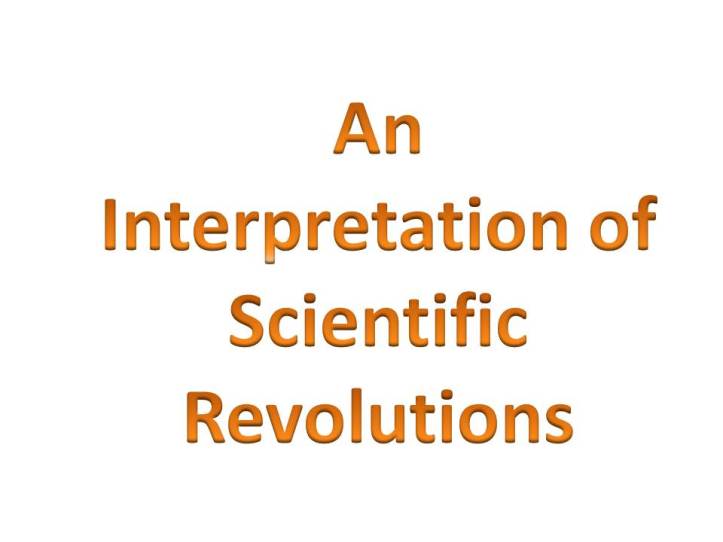The following is an attempt to interpret Thomas Kuhn’s ‘The Structure of Scientific Revolutions’ using the framework of a discipline which is eclectic, pragmatic and empirical in approach. The starting point of this interpretation is a review of ‘The Structure of Scientific Revolutions’ which the interested reader will find via the link in the Appendix. This second part is a response to Chapter 1 of Thomas Kuhn’s ‘The Structure of Scientific Revolutions’. In Chapter 1, Kuhn introduces #4 important concepts
#1 Historical revisionism of scientific revolutions obfuscates the antecedent phenomenon
#2 Scientific revolutions occur gradually
#3 Scientific revolutions require dialogue between proponents of conflicting models or views
#4 Normal science is distinct from the science of revolutions and contributes to the generation of the necessary tensions
In eclectic disciplines which draw from disparate sciences the above concepts have the potential to influence the evaluation of those same disciplines. Turning firstly to historical revisionism, an eclectic discipline is at risk of disengaging from the historical events occurring within the sciences which are drawn upon. The expertise necessary to evaluate those same events is contained within the relevant scientific communities and with it the ability to draw lessons from historical events. Even within a circumscribed scientific community, sufficient variation within the community is enough to influence the potential lessons that can be drawn particularly where the predictive utility of the leading model is difficult to evaluate. In such cases there is a risk of circularity in conclusions drawn which further impacts on future developments. One obvious solution is to develop expertise either jointly or resources with expertise in both fields.
With regards to the rate at which scientifc revolutions proceed a primary question is where such revolutions occur? In an eclectic discipline the question must be asked of whether such a revolution is occurring in other fields or within the eclectic discipline. Gradual events occur through subtle conversations within communities which can be missed if there is no direct involvement within that community. Imminent changes can be overlooked without knowledge of this discussion and this can be interpreted as stagnation within the discipline. With eclectic disciplines other avenues are open to the contribution towards scientific revolutions. These would include facilitation of the conversation and the contribution of an overview of perspectives for the purposes of comparison. In this regards such eclectic disciplines offer a natural forum for identifying obviously occurring debates between proponents of differing models and the identification of resolutions.
Normal science is firmly within the domain of the scientfic community and according to Kuhn is a defining characteristic of that same community. An eclectic discipline would fall outside of this domain unless as above, resources are allocated effectively and cooperatively. Normal science is that area which has the most potential to differentiates the eclectic discipline from circumscribed sciences and to create the distinct identities of and tensions between both.
Appendix
A Review of the Structure of Scientific Revolutions
An Interpretation of Scientific Revolutions – Part 1
Index: There are indices for the TAWOP site here and here Twitter: You can follow ‘The Amazing World of Psychiatry’ Twitter by clicking on this link. Podcast: You can listen to this post on Odiogo by clicking on this link (there may be a small delay between publishing of the blog article and the availability of the podcast). It is available for a limited period. TAWOP Channel: You can follow the TAWOP Channel on YouTube by clicking on this link. Responses: If you have any comments, you can leave them below or alternatively e-mail justinmarley17@yahoo.co.uk. Disclaimer: The comments made here represent the opinions of the author and do not represent the profession or any body/organisation. The comments made here are not meant as a source of medical advice and those seeking medical advice are advised to consult with their own doctor. The author is not responsible for the contents of any external sites that are linked to in this blog.

[…] An Interpretation of Scientific Revolutions – Part 2 […]
LikeLike
[…] An Interpretation of Scientific Revolutions – Part 2 […]
LikeLike
[…] An Interpretation of Scientific Revolutions – Part 2 […]
LikeLike
[…] An Interpretation of Scientific Revolutions – Part 2 […]
LikeLike
[…] An Interpretation of Scientific Revolutions – Part 2 […]
LikeLike
[…] An Interpretation of Scientific Revolutions – Part 2 […]
LikeLike
[…] An Interpretation of Scientific Revolutions – Part 2 […]
LikeLike
[…] An Interpretation of Scientific Revolutions – Part 2 […]
LikeLike
[…] An Interpretation of Scientific Revolutions – Part 2 […]
LikeLike
[…] An Interpretation of Scientific Revolutions – Part 2 […]
LikeLike
[…] An Interpretation of Scientific Revolutions – Part 2 […]
LikeLike
[…] An Interpretation of Scientific Revolutions – Part 2 […]
LikeLike
[…] An Interpretation of Scientific Revolutions – Part 2 […]
LikeLike
[…] An Interpretation of Scientific Revolutions – Part 2 […]
LikeLike
[…] An Interpretation of Scientific Revolutions – Part 2 […]
LikeLike
[…] An Interpretation of Scientific Revolutions – Part 2 […]
LikeLike
[…] An Interpretation of Scientific Revolutions – Part 2 […]
LikeLike
[…] An Interpretation of Scientific Revolutions – Part 2 […]
LikeLike
[…] An Interpretation of Scientific Revolutions – Part 2 […]
LikeLike
[…] An Interpretation of Scientific Revolutions – Part 2 […]
LikeLike